- What is Enterprise Resource Planning (ERP)?
- Enterprise Resource Planning Market Overview
- Why Should ERP Integration Matter to Your Organization?
- Features of ERP software
- How does an ERP system work?
- What are the different types of ERP systems?
- Is Your Organization Ready For an ERP System Integration?
- Factors to Consider for Successful ERP Integration
- How we built an ERP solution for the world’s largest furniture retailer – IKEA
- Various Platforms Appinventiv Uses for Streamlined ERP Integration
- Microsoft Dynamics 365
- SAP ERP
- Oracle ERP Cloud
- NetSuite
- Salesforce
- Workday
- Navigating the Challenges of ERP Integration with Appinventiv’s Expertise
- Cost of ERP System Integration
- Factors Determining the Cost of ERP Software Integration
- Ready to Streamline Your Business Operations with Seamless ERP Integration?
- FAQs
Growing companies eventually reach a point where Excel spreadsheets and other rudimentary practices no longer serve the purpose of their business. That’s when Enterprise Resource Planning (ERP) software comes to their rescue. They act as a transformative force that redefines how businesses operate and thrive in the modern landscape.
It is vital to understand that ERP integration goes beyond conventional solutions, efficiently collecting and organizing crucial business information. This empowers organizations to maintain streamlined operations, even during the time of expansion. While the term ERP is familiar to many business professionals, the full extent of what this software can achieve for their teams might still be underappreciated.
In this guide, we’ll explain what an ERP system is and what ERP integration can do for your organization. So, without further ado, let’s get started!
What is Enterprise Resource Planning (ERP)?
Enterprise Resource Planning or ERP refers to a type of software that helps organizations manage day-to-day business processes from one place. It can include activities such as inventory management, logistics management, accounting, healthcare, automotive and more.
The primary goal of an ERP system is to optimize and automate the processes to boost operational efficiency and company profitability.
Modern ERP systems use the latest technologies, such as machine learning and artificial intelligence development services to provide intelligence, visibility, and efficiency across every business unit.
Now that we have defined what an ERP system is, let’s have a look at a few interesting statistics indicating the growing popularity of ERP systems.
Enterprise Resource Planning Market Overview
As per the statistics, more than 53% of businesses believe ERP integration is one of the most prioritized avenues for investments. The top most important reasons to implement an ERP are increasing efficiency (35%) followed by cost advantage (29%).
Another report by Grand View Research indicates that the global ERP market will grow at a CAGR of 11% from 2023-2030, hitting a market value of over $123.41 billion by 2030. The key factors impacting the growth of the ERP market are the need for operational efficiency, the surge in adoption of cloud & mobile apps in enterprise digital transformation, and an increase in demand for data-driven decision-making.
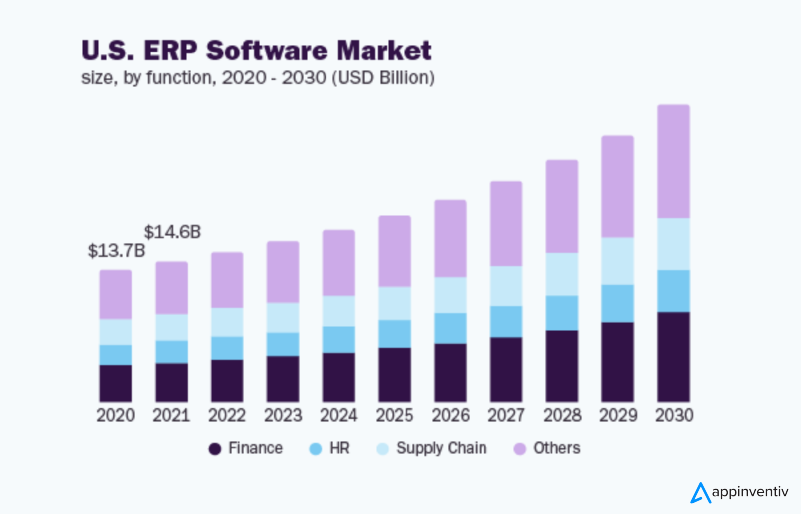
Why Should ERP Integration Matter to Your Organization?
Organizations opt for ERP integration to achieve various objectives, including business expansion, cost reduction, and operational improvement. ERP systems, when seamlessly integrated, facilitate legacy system modernization, making businesses adaptable to customer needs and enhancing overall customer experience.
Here are a few key benefits of the ERP system that contribute to your organization’s overall success:
Improved Productivity
ERP integration is capable of automating routine manual tasks and processes. This helps your business save a lot of time and remove instances of duplication, error, and rework. As a result, employees perform better and complete more tasks in less time. Also, integrating ERP systems allows your employees to spend less time on repetitive work and more on those tasks that generate revenue for your business.
Better Collaboration
The unified system that contains all business-related data improves cooperation between enterprise branches or departments. ERP software integration reduces communication delays across the whole company. This is beneficial if your organization has a distributed network of affiliates in several states or even in different continents.
Faster Decision Making
ERP integration provides a real-time view of data, with easy-to-use reporting and analysis that empowers intelligent decision making. For example, with an ERP system, you can see which workflows are efficient and which ones are losing you money.
Better Customer Service
Another major benefit of ERP integration is that it helps in offering better customer services. A centralized data storage provides all necessary information on sales and clientele. This makes it easier for sales managers and customer support staff to communicate with clients and reduce delays in offering services to customers.
ERP integration also helps in faster access to customer histories. This, in turn, adds to other benefits such as accurately analyzing data on customer behavior patterns and more precise predictions of demand that must be satisfied accordingly and in proper time.
Built-in Compliance
It’s important that your business maintains regulatory compliance. One of the most powerful advantages of ERP systems is that they help keep track of industry regulations and changes in compliance. This allows businesses to stay ahead and in compliance with guidelines, relevant laws, and specifications.
Scalability and Flexibility
Another important benefit of ERP software is that it allows adjusting its scale according to current needs and situations. An ERP system easily adapts to the expansion or reduction of the company on every level. ERP system integration allows the businesses to easily handle changes such as production increase, inventory extension, the addition of new functions, services, or users. In short, it helps in enterprise digital transformation.
Better Availability of Information
Advanced ERP systems enable the effective and centralized collection, processing, and storage of information on the product, sales, or customers. Thus, a single data system is used instead of multiple databases that require regular checks and synchronization to remove duplicate or obsolete information.
The increased quality of internal data of all kinds leads to further performance optimization on all levels of the enterprise. Particularly, supply chain and inventory management are the activities that benefit the most from ERP implementation.
Enhanced Reports
ERP software integration leads to reduced paperwork and improved communication among departments. It helps in the quick and easy submission of all kinds of reports such as financial, customer behavior, technical maintenance, etc.
[Also Read: Mobile ERP: Why must modern enterprises adopt cloud-based mobile ERP Solutions]
Features of ERP software
In order to deploy an ERP software, here are the few prominent features to keep in mind
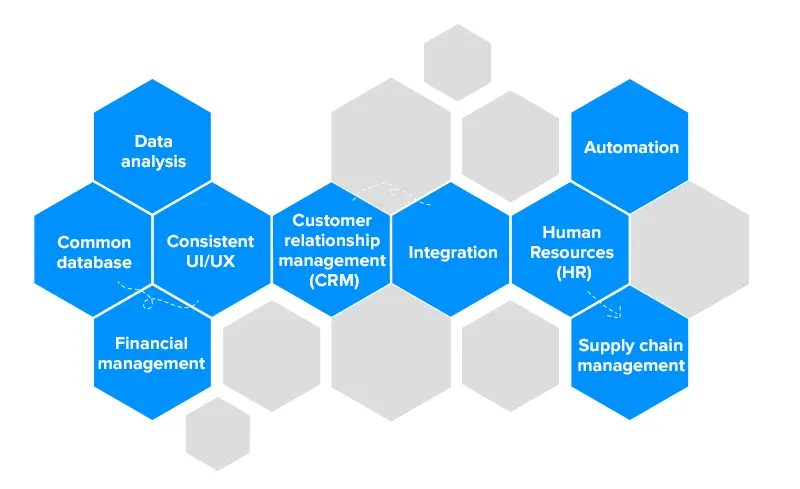
Common Database: ERP systems’ advantages stem from a common database that allows organizations to centralize different departments’ information. This data from a single source eliminates the need to merge separate databases manually. A common database enables a cross-functional and consistent view of the company.
Automation: Another feature necessary to develop an ERP software is the ability to automate repetitive tasks like invoice, payroll, and order processing. This reduces duplicative data entry and manual work, thereby saving time and reducing errors.
Automation allows your staff to focus on value-added work that takes advantage of their special knowledge and skills.
Consistent UI/UX: Everyone uses the same user interface (UI) and has the same user experience (UI) with an ERP across different roles and departments. Modules for HR, finance, and inventory management have the same look and feel. This increases the software’s adoption rate and makes it easier for staff to move between departments.
A consistent UX and UI increases efficiency because users can quickly find and understand information from all corners of the business.
Data Analysis: With every area of your business working under a unified ERP software, data on day-to-day operations can be shared across multiple departments and entities. It also allows getting real-time feedback to make better decisions. Through data analysis, you can uncover areas that are performing exceptionally well and those failing to meet expectations. You can then analyze problems and take immediate action to resolve them.
Integration: ERP integration is where ERP software is connected with other applications or systems to share data across these systems to improve insights as well as productivity. ERP systems have the ability to communicate with every application in the same ecosystem or with other existing business software.
ERP integration is beneficial for companies that have a variety of departments that need to connect with each other to avoid data duplication or repetitive orders.
Financial management: Financial management modules help businesses to make better spending decisions, manage assets, and create accurate financial reports. Any financial information that is needed to monitor and maintain the business is accessible on a single tick in the finance module.
Also read: ERP finance – Making Analytics and Reporting Easy for FinTech Enterprises
Customer Relationship Management (CRM): The CRM module provides an integrated toolset for managing customer data and tracking customer interactions.
CRM capabilities give an integrated view of your prospects and customers, allowing you to get the most out of sales, marketing, and customer service efforts. A CRM module within an ERP software can lead to more effective identification of new prospects, reduce the time involved with managing customer information, and assist with customer upselling.
Learn how to successfully implement a CRM system.
Human Resources (HR): The Human Resource module automates tasks involving the people in your organization, such as recruitment and boosting employee productivity. HR features in ERP software allow managers to better allocate employee time and resources.
Human Resource module also encompasses payroll capabilities, which offer functionalities for all employee payment tasks such as payment processing and application of deductions.
Supply chain management: A supply chain management module within an ERP software helps manufacturers, logistic providers, retailers, and distributors manage the flow of goods and services as efficiently as possible.
SCM features can handle everything from beginning to end, including planning, controlling, and executing supply chain processes.
How does an ERP system work?
ERP systems work using a defined, standard data structure. The information available by one department is immediately available to authorized users across the organization. This uniform structure helps everybody to stay on the same page.
For instance, when the shipment takes place for the last item in stock, the information must be recorded by the inventory management and sent to relevant departments so that the inventory can be replenished. The sales team also needs to be informed so that it doesn’t make promises that it can’t deliver.
Developing an ERP system can be a boon when a company has modules for each major business function. This ensures timely and accurate data entry.
[Also Read: Enterprise data warehouse: How it benefits your business?]
What are the different types of ERP systems?
Modern ERP systems are deployed in a variety of ways – in a public or private cloud, on-premise, or in various hybrid scenarios. Let us look at the multiple ERP software types and their benefits in detail below:
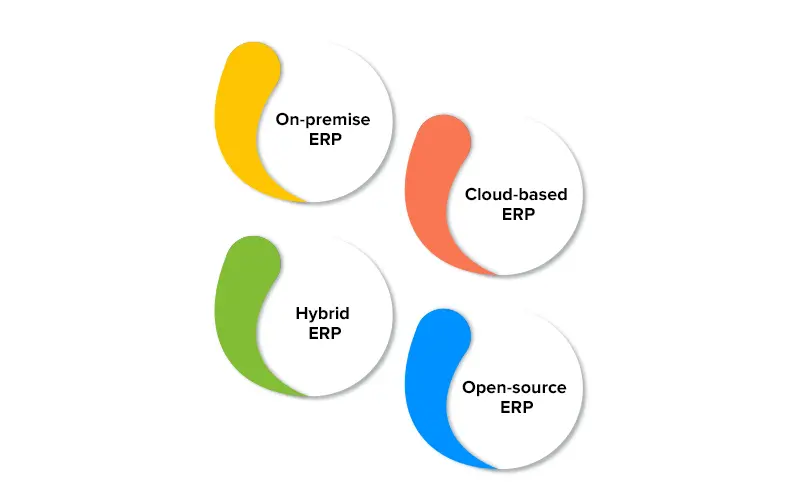
On-premise ERP: On-premise ERP allows you to control everything. This is the ERP solution you need to be in total control of your ERP system’s security. However, implementing this type of ERP would require you to have dedicated IT resources on your premises to handle application and server maintenance.
On-premise ERP comes with several advantages including:
- ERP modules can be customized as per your specific business requirements
- ERP modules offer strong integration options with your other systems
- Your sensitive and confidential data does not have to be handled by a third party
Cloud-based ERP: Often referred to as Software as a Service (SaaS), cloud-based ERP is managed by a third-party provider. The flexible design allows your staff to surf and store any data via any gadget.
This ERP system comes with several advantages like you don’t need to make a substantial initial investment to get the system. You also don’t require any specialized skills to implement it.
Hybrid ERP: For companies that want benefits of both (on-premise and cloud-based ERP) to meet their business needs, there is the hybrid cloud ERP model. Under this model, you can use the expertise of ERP vendors without the need to allow them to access all your information. This is also referred to as two-tier ERP.
Open-source ERP: Open-source ERP is an inexpensive and sometimes free alternative that’s suitable for some organizations. Many open-source ERP providers offer businesses to download free software and charge a low annual fee only if the customer wants cloud access.
But using this ERP will mean that your business will get minimal support from the provider, and system improvements and configuration tend to fall on you.
Now that we have seen the different types of ERP systems, let’s see if your business is ready for ERP system integration.
Also read: Leveraging AI Chatbots for ERP: Key Benefits and Strategies to Implement for Enterprises
Is Your Organization Ready For an ERP System Integration?
Signs that suggest the need for modern ERP system integration include having many unanswered business questions, spending excessive time on managing daily activities, missing out on fast-moving opportunities, and relying on manual processes.
Implementing ERP system integration addresses these challenges by providing answers to crucial business questions through metrics and KPIs, streamlining daily activities by integrating solutions and data into a unified system with a common interface.
It facilitates efficient communication among departments, leveraging advanced technologies like predictive analytics and machine learning to identify and capitalize on new opportunities.
Moreover, it automates manual processes to enhance overall efficiency and productivity, creating a seamless and optimized operational environment for your organization.
[Also Read: How ERP eCommerce Integration Can Help Scale Your Business to New Heights]
Factors to Consider for Successful ERP Integration
If you are seeking organizational growth, the best approach is to determine what you want your ERP system to achieve before initiating the integration process. Consider the following key factors that will lead you to a successful ERP integration.
Management Support: The integration of an ERP system will have a significant impact on your company’s operations. It will update business processes and change existing systems. To ensure the success of the integration, it is crucial for senior and mid-level managers, in addition to the IT department, to be involved from the beginning to the end of the project. This will provide proper visibility across the organization and underscore the integration’s importance.
Employee Involvement: Your ERP implementation team should comprise the best employees across your organization. These people know the inside out of your business. They can also be entrusted with critical decision-making responsibilities and authority.
Scope of Integration: You should define your integration scope that further includes the parameters and components that will be included in the project. It provides a clear understanding of the requirements and resources needed for the integration.
Budget: Organizations must create a proper budget to include all costs for the integration, such as software, hardware, and staff resources. Ensure tight control over the costs and create a good estimate of your integration costs. Also, consider what expenses you will need to account for post-integration.
Mobile-Friendly ERP: Your ERP system should be accessible via mobile devices. This means the display needs to be mobile responsive and easy to navigate on the reduced screen size.
Proactive Change Management: The ERP integration will result in changes in the system, process, and organization. It is important to take enough time to train people on new systems and processes. To make end-user training easier and successful, it should preferably start before the integration begins. Top management must be fully committed to incorporating the training cost as part of the ERP integration budget.
Experienced Integration Partner: Choose an ERP development company that is experienced in implementing ERP systems and integrating them. You must find a provider with experience in integrating ERP systems for a business like yours. Ask about their experience with similar industries, company sizes, and the number and types of departments involved.
How we built an ERP solution for the world’s largest furniture retailer – IKEA

As a leading custom software development service provider, we have developed many scalable ERP solutions based on our users’ requirements. Our aim is to help businesses optimize their processes and enable easy scalability with our ERP solutions.
We recently developed an ERP solution for IKEA, one of the world’s largest furniture companies. The powerful ERP solution helps walk-in customers go through the store’s product catalogs right from the in-store tablet panel.
Our ERP software development approach for IKEA was aimed at creating a two-fold solution that helps IKEA give customers an in-store catalog solution and use their personal information as a promotional tool.
The result? Our dedicated efforts led to the creation of a solution that is today getting expanded to the 7+ IKEA stores in the UAE. The retail outlet touts the solution as the biggest source of ROI measurement.
[Also Read: Strategies to improve the ROI on your enterprise application]
Various Platforms Appinventiv Uses for Streamlined ERP Integration
Our experts ensure that ERP integration aligns seamlessly with our client’s business objectives, providing them with scalable, efficient, and innovative solutions. Here are the multiple platforms we leverage for streamlined ERP integration:
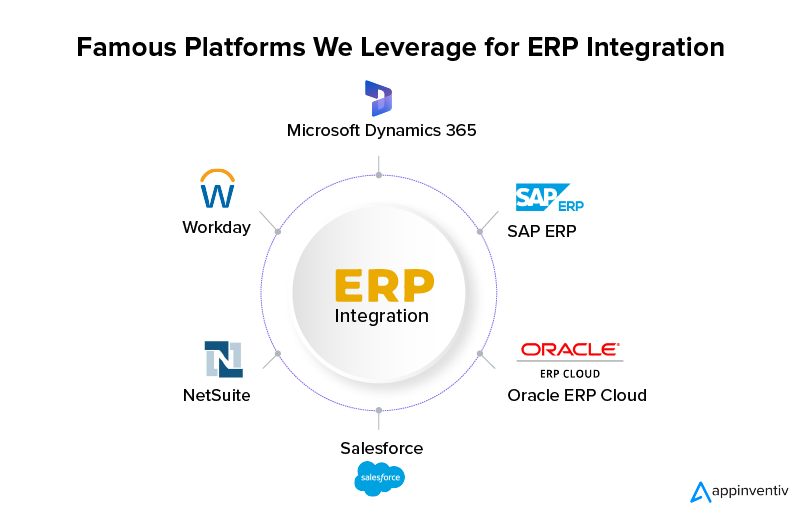
Microsoft Dynamics 365
We harness the capabilities of Microsoft Dynamics 365 to empower businesses with a unified cloud-based solution. Our integration strategies leverage Dynamics 365 to optimize financial operations and enhance customer engagement, resulting in a holistic digital transformation. This approach ensures agility and efficiency in all business processes.
SAP ERP
We rely on SAP ERP to revolutionize business operations. By integrating SAP ERP, we enable seamless collaboration, streamlined processes, and data-driven decision-making. Our customized approach caters to each client’s industry, resulting in improved productivity, scalability, and adaptability.
Oracle ERP Cloud
Our team leverages Oracle ERP Cloud to revolutionize business environments. By adopting a comprehensive integration strategy with Oracle, we empower clients with a state-of-the-art cloud-based platform for financial management, procurement, and project execution. Our goal is to enable businesses to achieve operational excellence, gain real-time insights, and embrace a future-ready ERP solution.
NetSuite
We prefer NetSuite for cloud-based ERP solutions that enhance efficiency. Our integration strategies focus on optimizing financial processes, order management, and inventory control. Businesses gain from scalable and agile ERP systems that easily adapt to changing needs.
Salesforce
We enhance customer relationships by integrating ERP with Salesforce. Through this integration, we create a unified ecosystem that offers a 360-degree view of customer interactions. By combining ERP data with Salesforce’s CRM functionalities, businesses benefit from streamlined processes, improved productivity, and valuable customer insights.
Workday
Our experts revolutionize human capital management by integrating Workday into ERP systems. This seamless connection to Workday’s cloud-based platform optimizes HR processes, payroll, and workforce planning. Our approach guarantees businesses a unified, efficient, and technologically advanced human resource management system.
Navigating the Challenges of ERP Integration with Appinventiv’s Expertise
Our experts are capable of providing strategic solutions to overcome challenges in effectively integrating ERP software for business growth. Let us help you understand how we navigate the related challenges in detail below:
Training Excellence
Enhancing user proficiency is crucial for ERP success. We prioritize robust training strategies to minimize the learning curve, ensuring optimal user engagement. Our approach guarantees operational continuity, even during staff transitions.
Cost-Effective Solutions
We acknowledge the financial impact of ERP implementation. Our primary objective is to minimize expenses, streamline deployment, and effectively manage systems. By adopting a future-oriented approach, we guarantee that your investments will generate lasting advantages.
Precision in Adjustment
Our experts specialize in meticulous customization for successful ERP integration. We excel in tailoring both custom and off-the-shelf solutions to align seamlessly with your organizational structure. Our precision in adjustment spans across all levels of management, ensuring a custom fit.
Cost of ERP System Integration
The average cost of integrating ERP software for small businesses or enterprises might range from $20,000 to $2,00,000. In some cases, it may even cost more. However, this is a very rough estimate. There are a number of factors that can increase or lower the final price, let us look at them in detail below:
Factors Determining the Cost of ERP Software Integration
The cost of integrating ERP solutions can vary widely based on several factors:
Scope of Integration
The cost of integrating ERP systems is notably affected by how extensively they need to connect with existing applications and processes. More intricate integrations usually involve linking various modules or connecting systems across a broad spectrum. This leads to higher expenses.
Customization Requirements
Customizing ERP integration to match specific business needs and workflows can result in additional costs. The extent of customization, whether it involves creating unique connectors or adapting the ERP to meet specific industry requirements, may influence the overall cost.
Data Migration and Cleanup
Extensive data migration or cleanup during integration can lead to extra costs. Achieving data consistency, accuracy, and compatibility across systems may require specialized efforts.
Training and Change Management
Training employees on the integrated ERP system and managing the organizational change that comes with it is crucial. Allocating resources for training programs and change management initiatives increases the overall cost.
Ongoing Support and Maintenance
Considering the costs related to ongoing support, updates, and maintenance is crucial. Regular updates and maintenance play a vital role in ensuring the sustained effectiveness of the integrated ERP solution.
Ready to Streamline Your Business Operations with Seamless ERP Integration?
In today’s dynamic business landscape, the integration of Enterprise Resource Planning (ERP) systems has become a cornerstone for operational efficiency. Streamlined ERP integration ensures that critical business processes seamlessly work together while making way for real-time collaboration, data accuracy, and informed decision-making.
This not only enhances the productivity of daily operations but also provides organizations with a competitive edge by staying agile and responsive to market demands.
Appinventiv can help you embark on a journey to streamline your business operations. Our seasoned professionals specialize in tailoring ERP integration solutions that align seamlessly with your unique business needs. From meticulous planning to execution, we ensure a smooth integration process, minimizing disruptions and maximizing the transformative benefits of ERP integration.
Get in touch to optimize your business processes, drive exceptional growth, and stay ahead in the fast-paced business landscape. Our experts will offer the best ERP software development services and help you improve the productivity of your business.
FAQs
Q. What is an ERP system in simple terms?
A. ERP is a software that helps businesses to run and monitor the performance of their daily operations. It stores data from across the company in a centralized repository and analyzes and reports on that information.
Q. How do I know I am ready for an ERP system?
A. Here are a few signs that indicate you’re ready for an ERP system:
- You are spending too much time monitoring daily activities
- You are missing out on great opportunities
- You have many unanswered questions related to your business
- You are spending too much time on manual processes
Q. Why implement an ERP system?
A. ERP software has become a vital tool for organizations because it saves time and money. An ERP provides visibility across departments that help executives and managers to focus their time and attention on the most important areas.
Q. Where to use ERP systems?
A. ERP systems can be used in areas such as:
- Marketing
- Human resource management
- Project management
- Finance management
- Automated reporting
- Business intelligence
Q. How to build an ERP system?
A. Building an ERP system can save a lot of money and improve productivity in the long run. This is how you can build an ERP system for your organization:
- Define the company’s goal and requirements
- Dive into UI/UX design
- Consider tech stack
- Integrate ERP modules
- Choose the right development partner
- Review the final product


Excellence Together
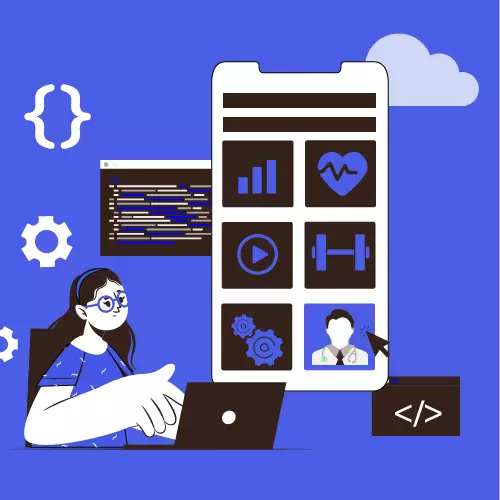
The Ultimate Business Guide to Healthcare Application Development in 2023
The healthcare industry has grown rapidly in recent years, particularly after the COVID-19 pandemic. According to Statista, revenue in the global healthcare market is estimated to grow to $57.86 billion in 2023, growing at a CAGR of 10.40% from 2023-2027, resulting in a market volume of $85.95 billion by 2027.
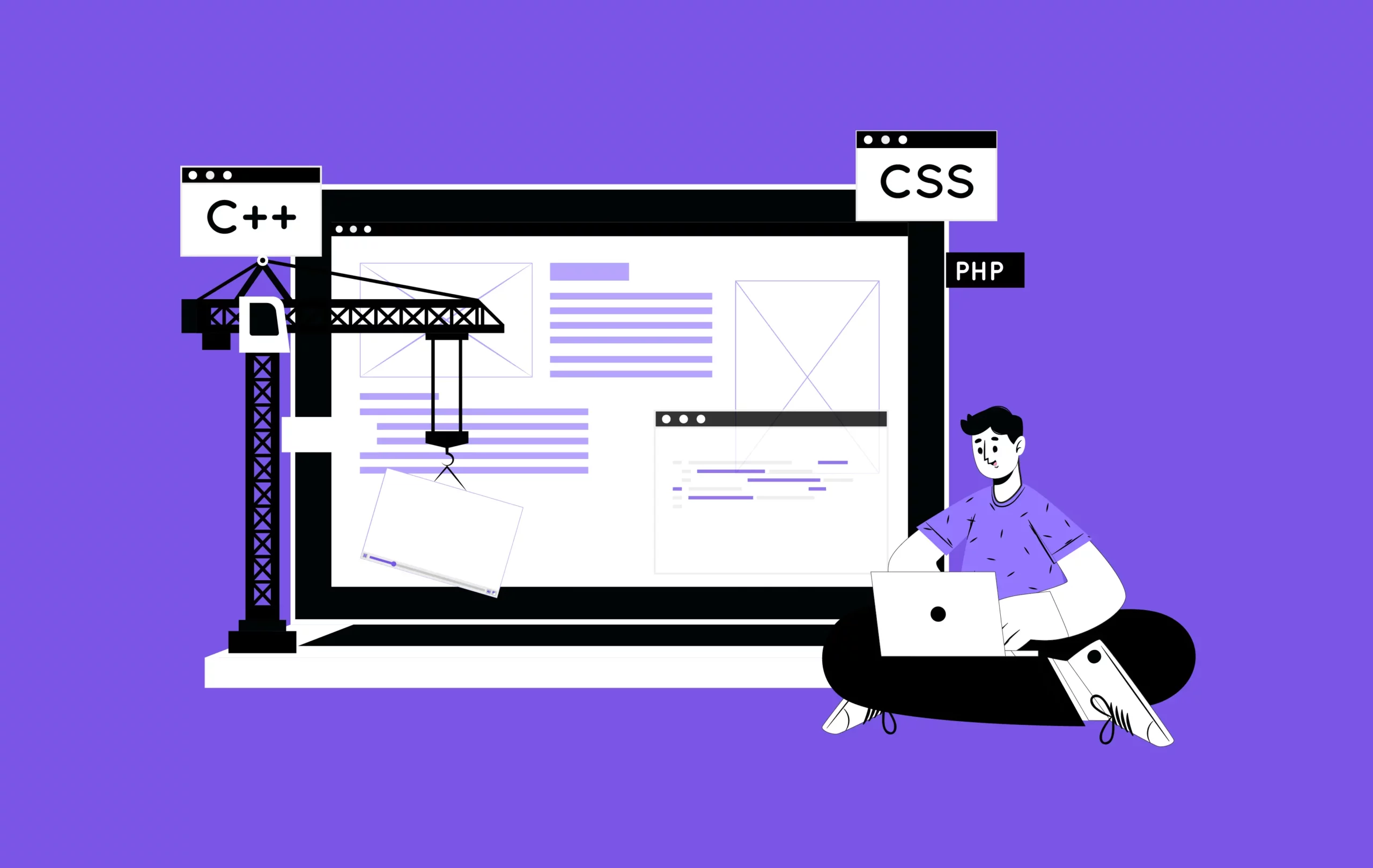
Web App Development - A Complete Guide for Businesses
In today’s digital age, having a strong online presence is the key to unlocking the door of business transformation and reaching the target audience. One of the most efficient ways to achieve this is through web app development. Web applications have grown at an unprecedented pace in the past decade, revolutionizing operations across various industries.…










